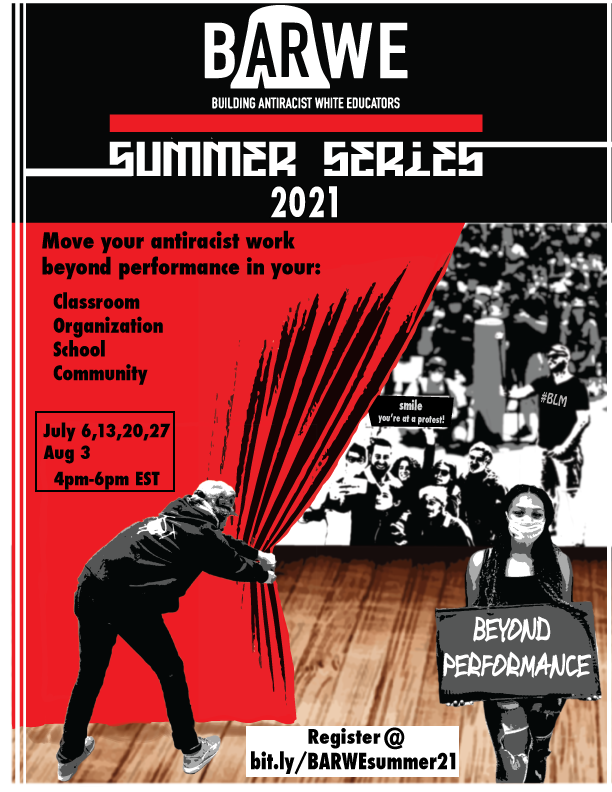The COVID-19 pandemic. Worldwide uprisings in response to police brutality. White supremacist violence at the Capitol and beyond. Over the past year, antiracist work has been pushed to the forefront across the country. But for many individuals and organizations, posting a Black Lives Matter statement on a website or starting an equity initiative has been more about performance than substantive change.
The past year has also pushed many of us, including BARWE as an organization, to find new ways to connect. We were able to host our first national events, including 4 Summer Reading conversations and multiple training sessions. We launched our first Advisory Group to help broaden our perspective as an organization. We also established a compensated accountability partnership with the Melanated Educators Collective, to help keep our work as an organization accountable to Black educators.
This summer, we hope to take this work further by launching our first Summer Series. Join us for 5 sessions to explore how we can take our work beyond performance, and build momentum for substantive antiracist work in ourselves, our classrooms, our schools / organizations, and our communities. Each session will include storytellers sharing how they have taken their antiracist work beyond performance. Each session will also include small group spaces to build connections and push work forward with folks across the country doing work in similar contexts.
This Series, like BARWE’s work in general, is designed to encourage white folks to take a more active and accountable role in antiracist work. We welcome educators of all races to participate. We acknowledge that we (as a group of white educators) don’t see it as our role to facilitate sessions on how to do antiracist work for Black, Brown, Indigenous, or Asian Folx.
The past year has also pushed many of us, including BARWE as an organization, to find new ways to connect. We were able to host our first national events, including 4 Summer Reading conversations and multiple training sessions. We launched our first Advisory Group to help broaden our perspective as an organization. We also established a compensated accountability partnership with the Melanated Educators Collective, to help keep our work as an organization accountable to Black educators.
This summer, we hope to take this work further by launching our first Summer Series. Join us for 5 sessions to explore how we can take our work beyond performance, and build momentum for substantive antiracist work in ourselves, our classrooms, our schools / organizations, and our communities. Each session will include storytellers sharing how they have taken their antiracist work beyond performance. Each session will also include small group spaces to build connections and push work forward with folks across the country doing work in similar contexts.
This Series, like BARWE’s work in general, is designed to encourage white folks to take a more active and accountable role in antiracist work. We welcome educators of all races to participate. We acknowledge that we (as a group of white educators) don’t see it as our role to facilitate sessions on how to do antiracist work for Black, Brown, Indigenous, or Asian Folx.
